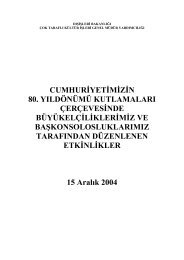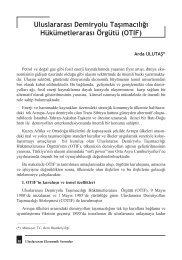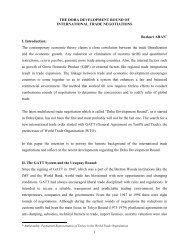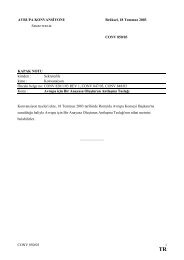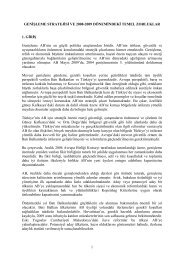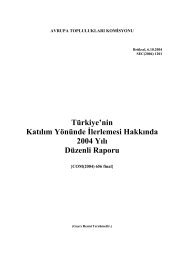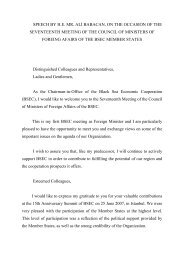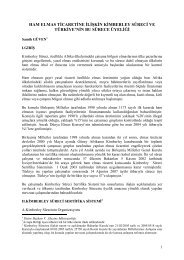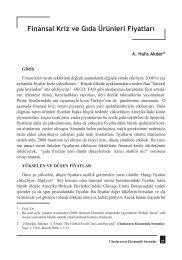ULUSLARARASI EKONOMİK SORUNLAR
ULUSLARARASI EKONOMİK SORUNLAR
ULUSLARARASI EKONOMİK SORUNLAR
You also want an ePaper? Increase the reach of your titles
YUMPU automatically turns print PDFs into web optimized ePapers that Google loves.
Özgür ÇALIŞKAN<br />
My argument in this paper is that when the current world realities and political<br />
history including international economic aspects, and major international relations<br />
theories are analyzed wholly, it can be said that the most important events in international<br />
politics are explained by differences in the capabilities of states, not by national/<br />
international economic forces and markets’ behaviors. Furthermore, the economic<br />
globalization has increased the importance of an efficient/strong state. The argument<br />
depends on three assumptions: First, the current political configuration of world and<br />
historical experience say that states are the main actors to determine national and<br />
international politics. In this part, the Realistic perspective has a good handle on<br />
explaining how the real world works. Second, with the globalization, the role and<br />
functions of state have changed and increased dramatically (especially in security and<br />
social policies). To maximize the benefits and minimize the risks of globalization, the<br />
state capabilities and national institutions are crucial for managing the change. Third,<br />
recalling the Karl Polanyi’s vision for markets and society is useful for analyzing the<br />
current globalization process and the near future of world.<br />
From the current state of the world: Globalization as a semi-virtual reality<br />
The globalization process is not truly global. As Stiglitz (2002) says, globalization<br />
has meant different things in different places (p.2). Currently, most of the world has<br />
been left out of the process: most of Africa and Latin America, Middle East, and Asia.<br />
The benefits of globalization have been distributed unevenly all over the world. One<br />
good example is about the foreign direct investments (FDIs) by TNCs, which are the<br />
common-cited drivers of globalization and usually emphasized as main source of<br />
development of the Third World. According to the UNCTAD data, as of 2008, more<br />
than 80 percent of global FDI stock has been located only in the EU, North America<br />
and Japan. Also more than 90 of the world’s top 100 non-financial TNCs are located<br />
mainly in these regions. In other words, TNCs are not transnational; they have been<br />
firmly anchored in their home bases in terms of the important location of assets, center<br />
of R&D, ownership, and management. Furthermore, under the absence of rules<br />
pertaining to competition, anti-trust, public health and safety, and environmental and<br />
social standards, such firms have led to market imperfections and negative externalities<br />
in the Third World.<br />
On the other hand, another face of world is about “the existence of a digital divide<br />
in which only 5 percent of the world is connected to the internet and 80 percent of web<br />
sites are published only in English” (p.4, Annan 2005). Annan (2005) notes that half of<br />
humanity has neither received nor made a simple telephone call. As for the economic<br />
Uluslararası Ekonomik Sorunlar 35




